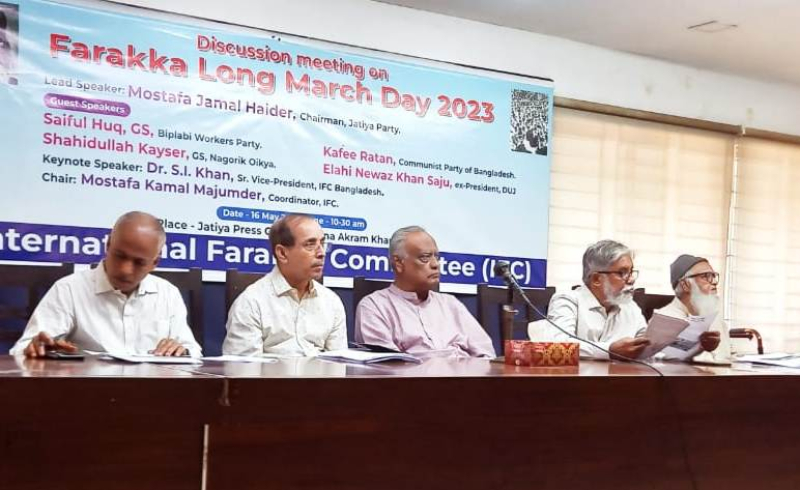- Iran dismisses Trump’s threats, vows swift response to any US attack |
- Student-led shrimp farming sparks rural aquaculture boom in Naogaon |
- Bangladesh Sets Path for Sustainable Farming by 2050 |
- Child rescued from deep tube-well hole in Ctg dies |
- Days ahead will be very challenging for journalists' - ABM Mosharraf |
Farakka Long March Day call: Raise voice to save common rivers

Speakers at the Farakka Long March Day programme organised by the International Farakka Committee on Tuesday, May 16, 2023.
Dhaka, 16 May 2023: Speakers at a discussion meeting on Tuesday called for coordinated efforts by enlisting the support of the people to save Bangladesh’s common rivers and the environment. The programme was organized marking the Farakka Long March Day 2023 by the International Farakka Committee at the National Press Club’s Moulana Akram Khan Hall.
16 May Tuesday was the Farakka Long March Day. On this day in 1976, leader of the toiling masses Maulana Abdul Hamid Khan Bhasani led the March from Rajshahi to Kansat near the Bangladesh-India border to protest unilateral withdrawal of Ganges water, ensure due share of water and protection of Bangladesh’s environment. The long march paved the way for signing of the first Ganges Water Sharing Treaty in 1977. Subsequently a MoU and an agreement were signed but without the main safety valve - guarantee clause. Bangladesh now can do nothing if water does not flow from upstream. On the other hand the country remains deprived of normal rainy season flooding due to construction of embankments on all 54 common rivers, but faces devastating floods at intervals. In the dry season a process of desertification is observed in the northern and the southwestern parts of Bangladesh. The Farakka Long March of MoulanaBhashani thus remains relevant even to this day, the speakers said.
They said, the largest delta in the world, Bangladesh owes its origin to rivers which carried silt to form the land over the millennia. Disruption of flows of rivers has threatened the geographical integrity of this land of rivers. The environmental balance of the country is in jeopardy due to reduction of flows of rivers for five decades. Harmful salinity of sea water has reached from the shore to Aricha in Manikganj with devastating effects on the river ecosystem. As the natural floodplains do no longer have normal flooding during the wet season, indigenous fishes, aquatic organisms, weeds, water lilies and other aquatic plants have disappeared from many districts. Again, being deprived of the dry season flows, many small rivers in the lower catchments of the Ganges and the Teesta have died. In such a situation the life and livelihood of people have come under severe stress.
Bangladesh would not have experienced such environmental disasters if International law relating to rivers and water was upheld. Natural systems, rivers cannot be divided or their flows diverted at political borders. Upper riparian nations can do nothing that causes harm to lower riparian nations. Common rivers should continue to flow from their origins to their outfalls in the sea. Otherwise they will die. Water experts of India and the rest of the world are aware of the river-environmental disasters in Bangladesh and are vocal against those. Raising voice against this cannot be termed as enmity. Works are on worldwide on proper sharing of rivers and cooperation between upper-riparian and lower-riparian peoples. Without this, rivers will not remain alive. Bangladesh should raise a strong voice to assert this and take steps to ensure natural flows of rivers and protect the riverine environment, the speakers said.
The speakers eulogized the foresight of Maulana Abdul Hamid Khan Bhasani and urged all concerned to take inspiration from the lesson he taught at the age of 96 in the movement to protect the environmental balance of Bangladesh.
The meeting sympathized with IFC New York chairman, AtiqurRahman Salu who has fallen ill and prayed for his early recovery.
Mostafa Jamal Haider, chairman, Jatiya Party (Jamal), Saiful Huq, general secretary, Biplabi Workers’ Party, Kafee Ratan, central leader of CPB, Shahidullah Kaysar, general secretary, Nagorik, Oikya, Elahi Newaz Khan former president, Dhaka Union of Journalists, Human rights movement leader Nurul Huda Chowdhury, Samyabadi Dal leader, Kazi Mostafa Kamal and IFC organising secretary Ataur Rahman Ata were among those who spoke at the function.
Earlier, Dr. SI Khan, former adviser to the UN on water and environment and Sr. Vice-President, IFC Bangladesh, made a keynote speech. Mostafa Kamal Majumder, coordinator of IFC presided over the discussion meeting.

